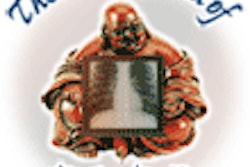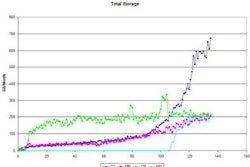All too often, PACS networks are purchased as if for a meeting on the eHarmony dating service. You start out by filling out a series of questions like eHarmony's patented "Relationship Questionnaire," which screens people for deep compatibility with you on as many as 29 different dimensions.
This "narrows the field from millions of candidates to a highly select group of singles with whom you share deep levels of compatibility," and matches your "compatibility in the most important areas of life." If you match, you then review their profiles and if you like what you see, progress to step two, the "Guided Communication option." This "allows you to choose five multiple-choice questions that will help you build a rapport and break the ice."
You then go through three series of multiple choice questions before you can get to the Open Communication option, "e-mailing each other through e-Harmony's safe, anonymous message system until you're ready to share your personal information." You can also elect to choose the Fast Track option and move directly to Open Communication with a match, bypassing the guided communication ... but that's a risky step in these days and times (or so I'm told).
Now I have nothing against Neil Clark Warren, Ph.D., even though I've tried his patented system and filled out the relationship questionnaire not once, but twice, and got matched up with women who were about as close a match to me as Mother Teresa. But buying a PACS, like choosing a life partner, takes a whole lot more than answering a few questions that "can bring a whole new level of certainty to the most important choice involved...."
The reality is that the process we undertake in buying multimillion-dollar PACS isn't so unlike that used in finding an e-Harmony match -- a few questions, a few answers, a meeting or two, then, perhaps, somewhere down the road in the not-so-distant future, an "I do."
Do we really know the person before we engage in open communication? Here's a short, sweet answer: No. And if you go forward trusting in the "patented system" and the marriage sucks? At least you have the option of divorce without that much of a penalty, unless you stay in it for a long time and have children trying to make a silk purse out of a sow's ear (been there, done that, and have the cancelled checks to prove it).
Do we really know the PACS vendor or the system before we engage in a formal commitment? Here's the same short sweet answer: No. And if you go forward trusting in the "patented system" and the PACS sucks? If you don't have a contract that clearly defines and delineates your expectations and both parties' requirements, you might be able to divorce yourself from the vendor, but the penalties are exceptionally high. It may cost you your job as well -- a minor detail. This is why an airtight contract is so very important.
A good contract doesn't make a PACS work better by any means, but it sure can help you through those rocky times when all isn't as you wish it were. Even if you don't like a lot of what your PACS does or doesn't do, if you can live with it for five years and do your best to work with the vendor to make it work as well as possible without somehow killing each other, you should be able to justify a new PACS and get out of this marriage from hell.
Hopefully you won't make the same mistakes again -- with a focus on the word hopefully because some people just never learn. The fact is 70% of all broken-hearted marriages end up in remarriage and 60% of those fail. Why? I think the saying goes: "Insanity is doing the same thing and expecting the outcome to be different."
Making the right choice
So, how do you make a good decision? I know of several facilities who took the time and effort to assemble an exceptionally large team of people from various departments to perform a detailed RFP evaluation on their semifinalists. They looked at functional and technical aspects, as well as the vendor's products and services, doing an incredibly thorough job of looking closely at every aspect that needed to be looked at.
In many cases, more than 500 detailed questions were asked and several sets of follow-up questions were sent to the vendor in what turned out to be an arduous and grueling four-month long process. The net result? The difference between the top vendors gave new meaning to the words "statistically insignificant"; in most of the cases less than 1% separated each of the top vendors scores, rendering any decision based solely on this extensive "detailed analysis" virtually worthless.
Is this unusual? Not really. It's like life, or marriage. Every day you live is another day you learn. You only learn through living, though, not by asking questions alone.
Everyone on eHarmony is looking for the love of their life. Responses to questions are carefully thought out to minimize the negatives and accentuate the positives. And so, too, it goes with RFPs.
That is why I've always preferred a one-on-one meeting with a vendor early on in the game rather than a long and protracted e-mail courtship that leads to disappointments when the meeting finally takes place. In the situation described above, the facilities had to largely fall back on established vendor relationships and other criteria in selecting their two finalists. Was everyone given a fair chance? Who knows?
With eHarmony, you have only what the other party cares to share along the way. And so it is with RFPs as well. At least with Match.com you have a "face and a paragraph" to help make the decision for you.
Is this fair? It depends on who you talk to. The facility will say they did the best they could with the information they were provided by the vendor. The vendor will say they answered the questions that the client asked.
Did the facility indeed ask the right questions? Did they get the right answers? What constitutes right and wrong, true and false? And if a weighted matrix is used, that also begs the question how the weight factors are determined for each question, especially since the weighting seemed to play a very heavy role in equalizing the final scores.
All told, the "process" begs the question: Does the means justify the end? Did spending months in the RFP process -- going from a mere interest to a more steady relationship -- really bring them any closer to making a decision on where the relationship will go? I'd tend to say no, but only because in the end it still came down to looks and a comfort factor. Shallow? Maybe...but it is what it is.
It's all a big gamble for everyone, especially considering the vendors (both winners and losers) probably have invested at least $40,000 to $50,000 in time and effort to pursue a relationship that was pretty much decided not to be from the start. It's the same in the dating game as well, except the investment isn't as great financially as emotionally (although with some...they can be equal).
If the scorings had been more disparate would it have made a difference? In the short term, yes, but in the long term, probably not. I've met women whom I thought by their descriptions and writings and conversations were my absolute soul mates. However, after getting to know them a while they were closer to Soul Train than soul mate.
In the end, it all boils down to a comfort factor: chemistry. Just like what you usually feel in the first 10 minutes after meeting someone. A friend and I had this discussion the other day and laughed about how insane it all really is.
What is described by many isn't really chemistry, but magnetism. Now, let's get technical. By sheer definition, magnetism is a phenomenon by which materials exert an attractive or repulsive force on other materials.
I find this is interesting because for there to be an attraction with magnetism, two polar opposites are needed (at least from the purely physics standpoint). This is contrary to the way most, but not all, relationships evolve. Go figure, huh?
Chemistry, on the other hand, is the science of the composition, structure, properties, and reactions of matter. Unlike magnetism, in which you are attracted or repulsed immediately, chemistry more often than not requires that you go through several different iterations using the same basic properties, and often takes years to find the right balance with the right individual that works for you. It almost never happens right off the bat.
Unfortunately, while magnets attract or repel right off the bat, you tend to lose a degree of attraction daily until what holds you together is so weak that it's easily pulled apart. Once the right balance is achieved with chemistry, you tend know just what it takes to keep it going strong and just add a little more potion day in and day out. That's what keeps couples married 50 years or more together -- when the magnets have long given out, then better living through chemistry takes over.
If you want to know what the next 10, 20, or 30 years will be like married to a person, a single meeting of your potential spouse's parents usually tells it all. Oh how I wish I had listened to my own intuition but … hey, you live and you learn. The same hold true with PACS.
Don't go to sites that have been up for six months or a year and are still in the honeymoon phase. Go to a site that is ready to replace their system with that vendor. Ask them if they would consider the vendor again. If so, why? If not, why not? What would they do differently? What would they have the vendor do differently?
Find out what you're in store for long-term and ignore the honeymoon-phase lovers that every vendor loves to take you to for site visits.
Realistic expectations in PACS and love are key. Unfortunately, so many sites -- and so many people -- feel that finding out as much as they can about the other person is the key to long-term success. In reality, we actually need to spend less time focusing on others and spend more time focusing on ourselves and our needs first before we can make a connection that will lead to a lasting, rock-solid relationship that is beneficial for everyone involved.
I have a small Chinese plaque on my bedroom wall that summarizes what I've found to be the very best approach to take, whether it's related to dating, marriage, or even a PACS selection. It consists of four simple words and their Chinese characters that, if listened to, can save time, money, and a lot of heartbreak. The words and message are incredibly simple. Listen to your heart.
By Michael J. CannavoAuntMinnie.com contributing writer
August 1, 2007
Michael J. Cannavo is a leading PACS consultant and has authored nearly 300 articles on PACS technology in the past 15 years. He can be reached via e-mail at [email protected].
The comments and observations expressed herein do not necessarily reflect the opinions of AuntMinnie.com, nor should they be construed as an endorsement or admonishment of any particular vendor, analyst, industry consultant, or consulting group. Rather, they should be taken as the personal observations of a guy who has, by his own account, been in this industry way too long.
Related Reading
Part XIV: Exploring PACS Secrets -- Reading the fine print, March 12, 2007
The 2006 PACSman Awards: Of Chiclets and cappuccino, November 29, 2006
Part XIII: Exploring PACS Secrets -- Penny-wise, pound-foolish, October 16, 2006
Part XII: Exploring PACS Secrets -- PACS and marriage, August 15, 2006
Part XI: Exploring PACS Secrets -- Stop the insanity, May 29, 2006
Copyright © 2007 AuntMinnie.com



















